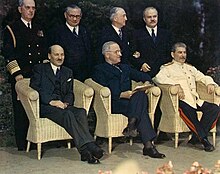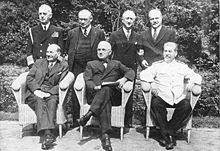Ernest Bevin
Ernest Bevin (born March 9, 1881 in Winsford , Somerset , † April 14, 1951 in London ) was a British trade union leader and politician ( Labor Party ). He was Minister of Labor from 1940 to 1945 and Foreign Minister from 1945 to 1951.
Live and act
(1881-1940)
Bevin was born in Somerset in 1881, the son of a farm laborer and a housemaid. He lost his mother at the age of eight and dropped out of school in Crediton at the age of nine. He later made up for his lack of schooling on an autodidactic basis.
From the age of eleven, Bevin had to rely on going to work to earn a living. Among other things, he worked as a truck driver in Bristol before becoming increasingly involved in the British trade union movement. In 1911 he was finally appointed secretary of the Dock, Wharf, Riverside and General Laborers' Union , which operates in England and Wales , and in 1914 he was appointed to organize the same nationwide.
In 1922, Bevin helped found the Transport and General Workers' Union (TGWU), which would soon become the largest union in Britain. As the first general secretary of the TGWU, he quickly became one of the most important trade union leaders in the country and thus a leading figure in British politics. At that time, Bevin saw himself ideologically as a moderate socialist: he rejected communism and the idea of implementing political goals with the help of force, and instead relied on the renewal of the state from within through reforms.
From 1925 he was a member of the General Council of the Trades Union Congress (TUC). In 1926 he took part in a leading position, but without personal enthusiasm, in the British general strike. He belonged to the pragmatic wing of the trade union movement, which believed in direct negotiations under threat of strike measures as a last resort to provide its members with material gains.
Although Bevin was a member of the Labor Party from its inception and later also a member of its lower house faction, he had little confidence in the parliamentary system. His relationship with first Labor prime minister Ramsay MacDonald was extremely bad and the relationship deteriorated even further when MacDonald formed a purpose alliance with the Conservatives in 1931.
In the 1930s, when the Labor Party was internally divided and politically weakened, Bevin found himself ready for bipartisan collaboration with the conservative governments of Baldwin and Chamberlain.
At the same time he began to deal intensively with foreign policy issues. As a staunch opponent of National Socialism , he emphatically rejected Chamberlain 's policy of appeasement towards Germany. Bevin's sharp attacks against the pacifist circles within the Labor Party led to the resignation of George Lansbury as party leader in 1935 , in his place Clement Attlee as the new party leader.
Minister in the Churchill War Cabinet (1940–1945)
At the beginning of October 1940, Winston Churchill appointed Bevin Minister for Labor and Military Service in his war government , he was also a member of the internal war cabinet . As a result of the Emergency Powers (Defense) Act (1939), Bevin was able to organize the state control of large parts of the British economy from this position, among other things through the redistribution of workers. During this time, Bevin was responsible for diverting 48,000 forced laborers from military service to the coal and steel industry . These workers came to be known as the Bevin Boys . Shortly after his appointment as Minister of Labor, Bevin was elected to the House of Commons unopposed for a London constituency. Bevin remained Minister of Labor until the Labor politicians left the coalition government in 1945.
Minister in the Attlee government (1945–1951)



After the Labor Party's victory in the general election of summer 1945, Bevin was appointed Foreign Minister in the new government by the new Prime Minister Clement Attlee . The office of Chancellor of the Exchequer (Chancellor of the Exchequer = Finance), originally for the Attlee, Bevin had envisioned been switched to Hugh Dalton transmitted.
In July 1945, shortly after the Labor Party's electoral victory, Bevin traveled to Potsdam with Attlee to take the place of Churchill and Eden as British representatives at the Potsdam Conference , at which the three leading victorious powers of World War II discussed theirs Policy towards defeated and occupied Germany.
As foreign minister, Bevin, who as a “labor leader” felt no emotional connection to the British colonial empire (“ British Empire ”), advocated a quick release of India and the other overseas possessions of Great Britain to independence. The indifference with which Bevin viewed the dissolution of the Empire contributed in particular to his view that it had only ever benefited the rich part of the British population (including the dukes and barons), while the working class remained excluded from the profits of the Empire be.
In view of the looming Cold War between East and West, Bevin emerged as a staunch anti-communist despite his socialist background . He made a decisive contribution to the institutionalization of the western block system insofar as he played a significant role in the creation of two key instruments with which the restructuring and organizational structuring of the western system was realized:
- the Marshall Plan help and
- of NATO .
When the German states were founded in the area of the British occupation zone , he ensured that in 1946 North Rhine-Westphalia with the capital Düsseldorf was formed from the northern part of the Rhineland and Westphalia , so that the industrial area on the Rhine and Ruhr , which was important for the reconstruction of Europe, was undivided there can.
Although many party colleagues - including Richard Stafford Cripps - advocated Bevin's prime ministry in place of Attlee, Bevin never claimed that post.
In 1945 he campaigned for a parliamentary assembly in the UN to be founded , whose members were to be elected directly by the citizens of the member countries.
In 1946 Bevin advocated that the Protectorate of British Somaliland and the areas of Italian Somaliland and Eastern Ethiopia / Ogaden , which had been administered by Great Britain since 1941, should continue to be united and jointly made a trust area. This “Bevin Plan” found no support from the other great powers, but brought Bevin a high reputation among Somali nationalists who strived for the unification of all Somalis in one Greater Somalia . Likewise, the Bevin Sforza Plan developed in 1949 for the future of the former Italian colony of Libya failed.
He rejected the Zionist movement's request to annul the 1939 White Paper , the provisions of which prevented Jewish immigration to Palestine. He also rejected the partition proposals for Palestine and opposed the creation of a Jewish state of Israel . The main motive for him was the thought that if Britain gave in too quickly it would damage its reputation in the Arab world and also create the impression that Britain was capitulating to the attacks that some extreme Zionist groups were carrying out against British institutions in Palestine at the time .
Ultimately, the British government gave in to pressure from international opinion and the influence of the United States and referred the problem to the United Nations, which in late 1947 adopted the UN Partition Plan for Palestine and thus laid the foundation for the establishment of the State of Israel.
Bevin also had to deal with the major payment problems that the UK budget has had since the end of the war. A US $ 3.75 billion bond received in 1945 was used up twice as fast as planned; In early 1947, the United Kingdom offered its last remaining foreign property (railways in Argentina) for sale.
“To demonstrate the urgency, in February he officially announced the withdrawal of British troops from Greece, teeming with communist partisans, and from Palestine. So [proclaimed] ... Harry Truman ... the Truman Doctrine: Arms Aid for Greece and Turkey. And at Harvard University in Boston, George Catlett Marshall announced his European aid program, whose political sense for America is not to let the European economic and human potential fall into the hands of the Soviets. ... Bevin also invented the term Marshall Plan to put a big American name in front of the program. "
In March 1951 Bevin was appointed Keeper of the Lord Seal, despite his poor health .
He died on April 14, 1951. After his death, he was in the Golders Green Crematorium in London cremated , his urn in Westminster Abbey buried. Bevin's grave is next to the Clement Attlees . The Bevin Glacier in Antarctica is named in his honor.
literature
- Douglas Hurd : Choose your Weapons: The British Foreign Secretary . Weidenfeld & Nicolson, London 2010. ISBN 978-0-297-85334-3 . (Chapter Bevin and Eden, pp. 288–362)
Web links
- Newspaper article about Ernest Bevin in the 20th century press kit of the ZBW - Leibniz Information Center for Economics .
Individual evidence
- ↑ The small encyclopedia , Encyclios-Verlag, Zurich, 1950, volume 1, page 172
- ↑ Michael Crowder: The Cambridge History of Africa: From c. 1940 to c. 1975 , vol. 8 of The Cambridge History of Africa , 1985, ISBN 978-0-521-22409-3 (pp. 465f.)
- ↑ spiegel.de: [1]
| personal data | |
|---|---|
| SURNAME | Bevin, Ernest |
| BRIEF DESCRIPTION | British trade union leader and Labor Party politician, Member of the House of Commons |
| DATE OF BIRTH | March 9, 1881 |
| PLACE OF BIRTH | Winsford , Somerset |
| DATE OF DEATH | April 14, 1951 |
| Place of death | London |

